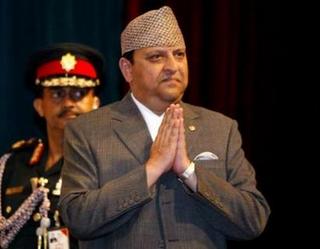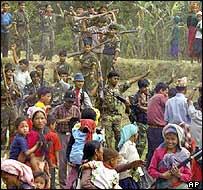BBC correspondent, Kathmandu

In recent weeks the authorities in both Bhutan and India have foiled attempts by Bhutanese refugees living in Nepal to return home.
They are among 105,000 Bhutanese who have been in seven camps in Nepal since the early 1990s, largely ignored by the world.
All are from Nepalese ethnic groups; most were stripped of their citizenship by Bhutan or expelled after campaigning for democracy.
Their restless mood is evident in the three Beldangi camps near the town of Damak.
This is a part of Nepal so low-lying that farmhouses are built on stilts to prevent flooding.
'Ordered out'
Travelling there, we passed paddy fields and palm trees until the sudden appearance of the camps - rows of bamboo huts bordered by open scrub where children kicked balls around and refugees queued for the telephone.
Even children born in these camps call Bhutan "home". And every adult has a story of exile to tell.
Forty-four-year-old Hari Bangaley lives here with his family. He was ordered out of Bhutan after campaigning against new citizenship laws which he says were loaded against ethnic Nepalis.
He had been imprisoned and, he alleges, tortured by being hung upside down and beaten.
"When the blood came out of my nose and mouth, an official said, You still hang him like this - a person will not die unless three bottles of blood is taken out from his body," says Hari.
Another exile, Sita Maya Rai, showed us an old Bhutan identity card which appeared to mark her as a second-class citizen.
She says she and her family fled after being abruptly told they were foreigners and must leave Bhutan.
Indian authorities ferried the exiles across Indian territory to Nepal, despite laws which allow Bhutanese and Nepalis unrestricted access to India.
Ethnic expulsion
Bhutan's actions appeared to be based on a desire to maintain its secluded Buddhist identity. Many people there say this was threatened by the size of the mostly Hindu Nepali-speaking population.
Indeed, there are still far more Nepali-speakers within Bhutan than in the camps.
Bhutan insists many Nepali-speakers were illegal immigrants or otherwise non-Bhutanese, and that most people leaving around 1990 did so voluntarily, forfeiting their citizenship.
The UN High Commission for Refugees (UNHCR), which is mandated to protect them, disagrees, saying these people are Bhutanese and were evicted. International human rights groups call the process "one of the largest ethnic expulsions in modern history".
The camps' confined conditions engender boredom and despair.
People depend on World Food Programme rations. Some do casual jobs like weaving, but officially, paid work is forbidden both inside and outside the camps.
Young people queue for special permits just to live in Damak to study.
"You depend completely on others," says Sita Maya. "It's a miserable existence."
Defiant
Earlier this month she joined hundreds of others in a bid to cross into India en route back to Bhutan. Indian forces chased them back.
The attempt was organised by political groups among the refugees. But the UNHCR criticised the groups for acting unilaterally and putting the refugees at risk.
"Can you imagine, they took very young children, handicapped people," says UNHCR representative in Nepal Abraham Abraham.
"They put them onto buses saying these buses were provided by UNHCR for them to return home."
He accuses the groups of using vulnerable refugees for political ends. Return programmes should involve both governments and the UNHCR, he says.
But refugee political groupings are defiant.
"People are ready to go back to Bhutan," says SR Subba, chairman of the Human Rights Organisation of Bhutan, which organised the abortive crossing. "They pressurise us to organise and lead them."
Days later another group were turned back at the Bhutanese border. Mr Subba says such attempts will continue "till we achieve our goal".
Some, however, wonder whether Bhutan will ever let them back, because even after 15 rounds of Nepal-Bhutan talks, not a single one has returned.
Frustrated
After the fifteenth and latest round, in 2003, Bhutan conceded that three-quarters of the refugees in the one camp surveyed had a right to return.
But it said nearly all would have to stay two years in transit camps while proving their loyalty to the country. Even bona-fide Bhutanese would not get their homes back.
Bhutan bans the UNHCR from its soil and the refugee agency has given up promoting returns. It suggests alternatives - resettlement in third countries, or in Nepal itself.
Like others, 30-year-old Manarath Khanal reluctantly admits he may have to settle for that.
His voice cracking with emotion, he says many refugees have committed suicide and that every time people think about Bhutan "they are frustrated and depressed".
"Bhutan is the best option," he says. "But I don't want to be a refugee any more. I am fed up."
For him, life in the camps is unbearable - and any way out is desirable. Sphere: Related Content












